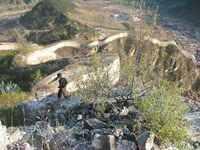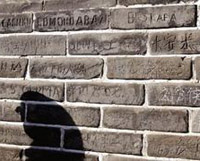
Suggestions and blueprints are being collected from home and abroad to help renovate the Great Wall, which now faces unprecedented devastation due to natural weathering, graffiti and out-of-order construction.
"We have received more than 330 pieces of advice on how to repair the 'scars' on the Great Wall," Dong Huiyao, vice-president of the Great Wall Society of China, said yesterday.
All these suggestions will be sent to an expert committee under the society's guidance to map out concrete renovation measures, Dong said.
The ongoing campaign, jointly launched by the society and the scenic administration bureau of Badaling, aims to raise people's awareness of the problem.
 As the Chinese saying goes, "He who does not climb the Great Wall is not a true man." The Wall at Badaling received more than 200,000 true men, women and children during the week-long National Day holiday this year. As the Chinese saying goes, "He who does not climb the Great Wall is not a true man." The Wall at Badaling received more than 200,000 true men, women and children during the week-long National Day holiday this year.
But nearly every touchable brick from the Badaling section is carved with people's names or graffiti, either in Chinese or foreign languages, said a staff member with the society.
Tourists have used knives to carve remarks and incisions of up to half a centimetre in depth, or have painted on the wall with ink and paint. The earliest graffiti can be traced to the 1950s.
Checks on more than 100 spots organized by Dong's society indicated that less than 20 per cent of the Great Wall constructed during the Ming Dynasty (1368-1644) is in good condition. And Badaling is not the only place. Other places report that the Wall was unable to withstand erosion caused by the elements and calamities inflicted by people.
Local residents have carted off Great Wall bricks to build their houses, sheep corrals and pigsties. Some parts were demolished to make way for roads and residential buildings.
Almost a 100-metre stretch of the Wall in Xinxing Village, Zhongwei city in Northwest China's Ningxia Hui Autonomous Region was destroyed in January after being plundered for road-building materials, reports said.
Dong told China Daily the State Council is drafting a regulation to protect the Great Wall as a whole, which it hopes will take effect next year.
The 629-kilometre section of the Great Wall in the Beijing area is already protected by a municipality regulation that went into effect from August 1, 2003.
Experts hailed it a good start in protecting the cultural heritage, which is actually a series of walls built and rebuilt by different dynasties over 2,000 years.
(China Daily November 30, 2005)
|

